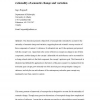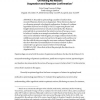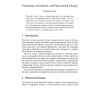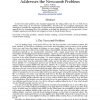91
Voted
SYNTHESE
2010
14 years 7 months ago
2010
Most scientific models are not physical objects, and this raises important questions. What sort of entity are models, what is truth in a model, and how do we learn about models? In...
SYNTHESE
2010
14 years 11 months ago
2010
I develop a strategy for representing epistemic states and epistemic changes that seeks to be sensitive to the difference between voluntary and involuntary aspects of our epistemi...
93
Voted
SYNTHESE
2010
14 years 11 months ago
2010
: The discussion presents a framework of concepts that is intended to account for the rationality of semantic change and variation, suggesting that each scientific concept consists...
SYNTHESE
2010
14 years 11 months ago
2010
82
Voted
SYNTHESE
2010
14 years 11 months ago
2010
: Some intuitive normative principles raise vexing „detaching problems‟ by their failure to license modus ponens. I examine three such principles (a self-reliance principle and...
SYNTHESE
2010
14 years 11 months ago
2010
SYNTHESE
2010
14 years 11 months ago
2010
SYNTHESE
2010
14 years 11 months ago
2010
77
Voted
SYNTHESE
2010
14 years 11 months ago
2010
Subjects communicated prior to playing trust games; the richness of the communication media and the topics of conversation were manipulated. Communication richness failed to produ...
94
Voted
SYNTHESE
2010
14 years 11 months ago
2010
In the Newcomb problem, the standard arguments for taking either one box or both boxes adduce what seem to be relevant considerations, but they are not complete arguments, and att...




